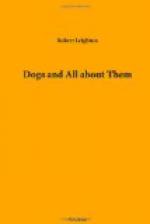It is not judicious to wet a long-haired dog much, but a short-haired one may have the chest and throat well fomented several times a day, and well rubbed dry afterwards. Heat applied to the chests of long-haired dogs by means of a flat iron will also effect good.
The following is an excellent tonic: Sulphate of quinine, 1/8 to 3 grains; powdered rhubarb, 2 to 10 grains; extract of taraxacum, 3 to 20 grains; make a bolus. Thrice daily.
During convalescence good food, Virol, Spratts’ invalid food and invalid biscuit, moderate exercise, fresh air, and protection from cold. These, with an occasional mild dose of castor oil or rhubarb, are to be our sheet-anchors. I find no better tonic than the tablets of Phosferine. One quarter of a tablet thrice daily, rolled in tissue paper, for a Toy dog, up to two tablets for a dog of Mastiff size.
BRONCHITIS.
Dogs that have been exposed to wet, or that have been put to lie in a damp or draughty kennel with insufficient food, are not less liable than their masters to catch a severe cold, which, if not promptly attended to, may extend downward to the lining membranes of bronchi or lungs. In such cases there is always symptoms more or less of fever, with fits of shivering and thirst, accompanied with dullness, a tired appearance and loss of appetite. The breath is short, inspirations painful, and there is a rattling of mucus in chest or throat. The most prominent symptom, perhaps, is the frequent cough. It is at first dry, ringing, and evidently painful; in a few days, however, or sooner, it softens, and there is a discharge of frothy mucus with it, and, in the latter stages, of pus and ropy mucus.
Treatment—Keep the patient in a comfortable, well-ventilated apartment, with free access in and out if the weather be dry. Let the bowels be freely acted upon to begin with, but no weakening discharge from the bowels must be kept up. After the bowels have been moved we should commence the exhibition of small doses of tartar emetic with squills and opium thrice a day. If the cough is very troublesome, give this mixture: Tincture of squills, 5 drops to 30; paregoric, 10 drops to 60; tartar emetic, one-sixteenth of a grain to 1 grain; syrup and water a sufficiency. Thrice daily.
We may give a full dose of opium every night. In mild cases carbonate of ammonia may be tried; it often does good, the dose being from two grains to ten in camphor water, or even plain water.
The chronic form of bronchitis will always yield, if the dog is young, to careful feeding, moderate exercise, and the exhibition of cod-liver oil with a mild iron tonic. The exercise, however, must be moderate, and the dog kept from the water. A few drops to a teaspoonful of paregoric, given at night, will do good, and the bowels should be kept regular, and a simple laxative pill given now and then.
DIARRHOEA,
or looseness of the bowels, or purging, is a very common disease among dogs of all ages and breeds. It is, nevertheless, more common among puppies about three or four months old, and among dogs who have reached the age of from seven to ten years. It is often symptomatic of other ailments.




